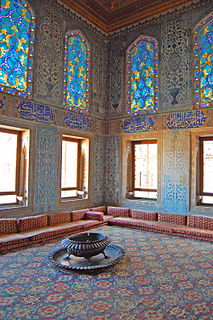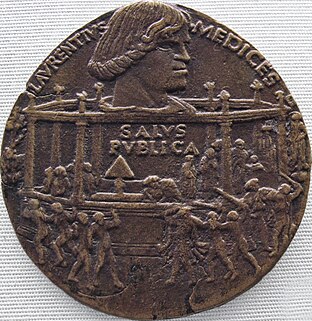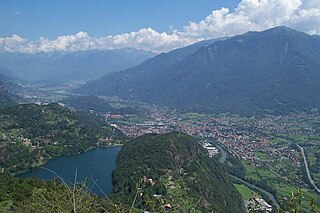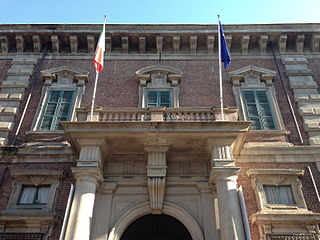
The Della Rovere family was a noble family of Italy. It had humble origins in Savona, in Liguria, and acquired power and influence through nepotism and ambitious marriages arranged by two Della Rovere popes: Francesco Della Rovere, who ruled as Sixtus IV from 1471 to 1484) and his nephew Giuliano, who became Julius II in 1503. Sixtus IV built the Sistine Chapel, which is named for him. The Basilica of San Pietro in Vincoli in Rome is the family church of the Della Rovere. Members of the family were influential in the Church of Rome, and as dukes of Urbino; that title was extinguished with the death of Francesco Maria II in 1631, and the family died out with the death of his granddaughter Vittoria, Grand Duchess of Tuscany.

The Italian Peninsula, also known as the Italic Peninsula or the Apennine Peninsula, is a peninsula extending from the southern Alps in the north to the central Mediterranean Sea in the south. It is nicknamed lo Stivale. Three smaller peninsulas contribute to this characteristic shape, namely Calabria, Salento and Gargano. The backbone of the Italian Peninsula consists of the Apennine Mountains, from which it takes one of its names. The peninsula comprises much of Italy, and also includes the microstates of San Marino and Vatican City and the extraterritorial sovereign territory of the Sovereign Military Order of Malta.

A seraglio or serail is the sequestered living quarters used by wives and concubines in an Ottoman household. The term harem is a generic term for domestic spaces reserved for women in a Muslim family, which can also refer to the women themselves. The Ottoman Imperial Harem was known in Ottoman Turkish as Harem-i Hümâyûn.
Pope Benedict IV was the bishop of Rome and ruler of the Papal States from 1 February 900 to his death. The tenth-century historian Flodoard, who nicknamed him "the Great", commended his noble birth and public generosity.

The Pazzi conspiracy was a plot by members of the Pazzi family and others to displace the Medici family as rulers of Renaissance Florence.

"The Doctrine of Fascism" is an essay attributed to Benito Mussolini. In truth, the first part of the essay, entitled "Idee Fondamentali", was written by philosopher Giovanni Gentile, while only the second part is the work of Mussolini himself.

Darfo Boario Terme is a comune in the province of Brescia, in Lombardy, northern Italy. The name combines Darfo, the capoluogo, with Boario Terme, the largest frazione.

The Enciclopedia Italiana di Scienze, Lettere ed Arti, best known as Treccani for its developer Giovanni Treccani or Enciclopedia Italiana, is an Italian-language encyclopaedia. The publication Encyclopaedias: Their History Throughout The Ages regards it as one of the greatest encyclopaedias along with the Encyclopædia Britannica and others.
In classical scholarship, the editio princeps of a work is the first printed edition of the work, that previously had existed only in manuscripts, which could be circulated only after being copied by hand.

Monteroni di Lecce (Salentino: Muntrùni is a town and comune in the province of Lecce, in Apulia, southern Italy. In 2008, it had 13,800 inhabitants. It is 7 kilometres from Lecce, in the Salento – the historic Terra d'Otranto.

Sandro Chia is an Italian painter and sculptor. In the late 1970s and early 1980s he was, with Francesco Clemente, Enzo Cucchi, Nicola De Maria, and Mimmo Paladino, a principal member of the Italian Neo-Expressionist movement which was baptised Transavanguardia by Achille Bonito Oliva.
Agugliastra or Ogliastra was an administrative subdivision of Pisan and Aragonese Sardinia..

The Accademia di Belle Arti di Brera, also known as the Accademia di Brera or Brera Academy, is a state-run tertiary public academy of fine arts in Milan, Italy. It shares its history, and its main building, with the Pinacoteca di Brera, Milan's main public museum for art. In 2010 an agreement was signed to move the accademia to a former military barracks, the Caserma Magenta in via Mascheroni, but the move had not happened by early 2017.
Federico Allasio was an Italian footballer who was midfielder and manager from Turin. He started his footballing career with hometown side Torino, before going on to play for Genoa and Suzzara.

Manlio Bacigalupo was an Italian association football goalkeeper and manager from Vado Ligure, Savona.

Giuseppe Chiappella was an Italian football midfielder and manager. He started his playing career with Pisa, but is most famous for making over 300 appearances for Fiorentina. He represented Italy at international level in 17 games between 1953 and 1957.

The Domini di Terraferma was the hinterland territories of the Republic of Venice beyond the Adriatic coast in Northeast Italy. They were one of the three subdivisions of the Republic's possessions, the other two being the original Dogado (Duchy) and the Stato da Màr.
The Dizionario Biografico degli Italiani is a biographical dictionary published by the Istituto dell'Enciclopedia Italiana, started in 1925 and completed in 2020. It includes about 40,000 biographies of distinguished Italians. The entries are signed by their authors and provide a rich bibliography.

The Accademia Pontaniana was the first academy in the modern sense, as a learned society for scholars and humanists and guided by a formal statute. Patronized by Alfonso V of Aragon, it was founded by the poet Antonio Beccadelli in Naples during the revival of classical learning and later led by Giovanni Pontano who gave it a more official character to the meetings.
Luciano Erba was an Italian poet, literary critic and translator.













